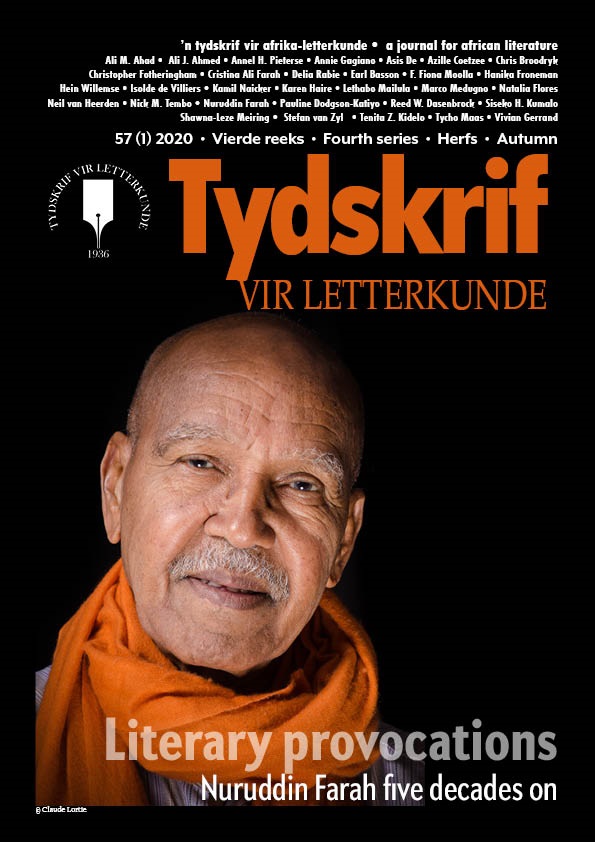Lost years of a nomad: Exploring Indian experience in Nuruddin Farah’s oeuvre
DOI:
https://doi.org/10.17159/2309-9070/tvl.v.57i1.8059Keywords:
biographical criticism, Indian experience, nomad, cosmopolitanAbstract
To honor Nuruddin Farah’s fifty-year-long writing journey, this article explores his time in India (1966–69) and the influence it had on making him a leading postcolonial writer. My approach is largely biographical. I begin with his decision to turn down a scholarship at an American University, which some critics view as immature or even eccentric. I challenge this view of his choice instead to enroll for a degree in philosophy, literature and sociology at the Government College of Panjab University at Chandigarh in 1966 and to make what was then a country of poverty and even famine his first diasporic destination. I argue that this was a well-thought-out, politically correct and wise decision in the global context of international relationships in the 1960s. I also explore Farah’s brief association with Indian culture and the knowledge he acquired of Indian philosophy and literature to explain his decision to adopt a feminist perspective to write on injustice against women and the powerless and religious intolerance rather than focus on issues such as independence realpolitik like leading African writers at the time. His first manuscript, published in 1970 as From a Crooked Rib, was a Penguin modern classic by 2004. I argue that this novel was importantly shaped by his Indian experience. I also explore the influence of two novels on the young Farah on his personal life, ideology and writing even before he went to India: W. Somerset Maugham’s novel The Razor’s Edge (1944) and Thakazhi Sivasankara Pillai’s classic Chemmeen (1956). This is the first substantial investigation of the effect of Farah’s Indian experience.
Downloads
References
Alden, Patricia & Louis Tremaine. “How Can We Talk of Democracy? An Interview with Nuruddin Farah.” Emerging Perspectives on Nuruddin Farah, edited by Derek Wright. Africa World Press, 2002, pp. 25–46.
Appiah, Kwame Anthony. “For Nuruddin Farah.” World Literature Today. vol. 72, no. 4, 1998. p. 703. DOI: https://doi.org/10.2307/40154254.
Appiah, Kwame Anthony. “Princeton Professor K. Anthony Appiah interviewed African novelist Nuruddin Farah about his recently released novel, Knots.” YouTube. 21 Feb. 2007, www.youtube.com/watch?v=jY1Xh9hHK-E. Accessed 24 Apr. 2019.
Bardolph, Jacqueline. “Dreams and Identity in the Novels of Nuruddin Farah.” Research in African Literatures vol. 29, no. 1, 1998, pp. 163–73.
Farah, Nuruddin. From a Crooked Rib. Penguin. 2006.
Farah, Nuruddin. Hiding in Plain Sight. Riverhead, 2014.
Farah, Nuruddin. “Ibsen, In Other Words.” Nordlit vol. 34, 2015, pp. 15–22. DOI: https://doi.org/10.7557/13.3350.
Farah, Nuruddin. “Why I Write”. Emerging Perspectives on Nuruddin Farah, edited by Derek Wright. Africa World Press, 2002. pp. 1–13.
Farah, Nuruddin & F. Fiona Moolla. “Reflecting back, projecting forward: An Interview with Nuruddin Farah” Tydskrif vir Letterkunde vol. 57, no. 1, pp. 23-29.
Gray, Stephen. “Interview with Nuruddin Farah.” English in Africa vol. 27, no. 1, 2000, pp. 131–9. www.jstor.org/stable/40238895.
Hawley, John C. “Nuruddin Farah—Tribalism, Orality, and Postcolonial Ultimate Reality and Meaning in Contemporary Somalia.” Ultimate Reality and Meaning vol. 19, no. 3, 1996, pp. 189–205. DOI: https://doi.org/10.3138/uram.19.3.189.
Hitchcock, Peter. The Long Space: Transnationalism and Postcolonial Form. Stanford U P, 2010.
Jaggi, Maya. “Nuruddin Farah: A Life in Writing.” The Guardian. 21 Sep. 2012, www.theguardian.com/culture/2012/sep/21/nuruddin-salah-life-in-writing. Accessed 24 Apr. 2019.
Metz, Helen Chapin. Somalia: A Country Study. Federal Research Division Library of Congress, 1993.
Moolla, F. Fiona. Reading Nuruddin Farah: The Individual, the Novel & the Idea of Home. James Currey, 2014.
Moore, Gerald. H. “Nomads and Feminists: The Novels of Nuruddin Farah.” The International Fiction Review vol. 11, no. 1, 1984, pp. 3–12.
Samatar, Ahmed I. “Interview with Nuruddin Farah.” Bildhaan: An International Journal of Somali Studies vol. 1, 2001, pp. 87–106.
Sethi, Rumina. “Rumina Sethi in conversation with Nurrudin Farah, Department of English, Panjab University.” YouTube. 27 Apr. 2017. www.youtube.com/watch?v=lNxxpcDY0OA. Accessed 21 May 2019.
Vettica, Anna M. M. “Golden milestone.” The Hindu BusinessLine. www.thehindubusinessline.com/blink/watch/golden-milestone/article7899728.ece.
Wright, Derek. “Parenting the Nation: Some Observations on Nuruddin Farah’s Maps.” College Literature vol. 19, no. 10, 1993, pp. 176–84.
Downloads
Published
Issue
Section
License
Copyright (c) 2020 Tydskrif vir Letterkunde

This work is licensed under a Creative Commons Attribution-ShareAlike 4.0 International License.


 https://orcid.org/0000-0001-6465-6584
https://orcid.org/0000-0001-6465-6584


.png)